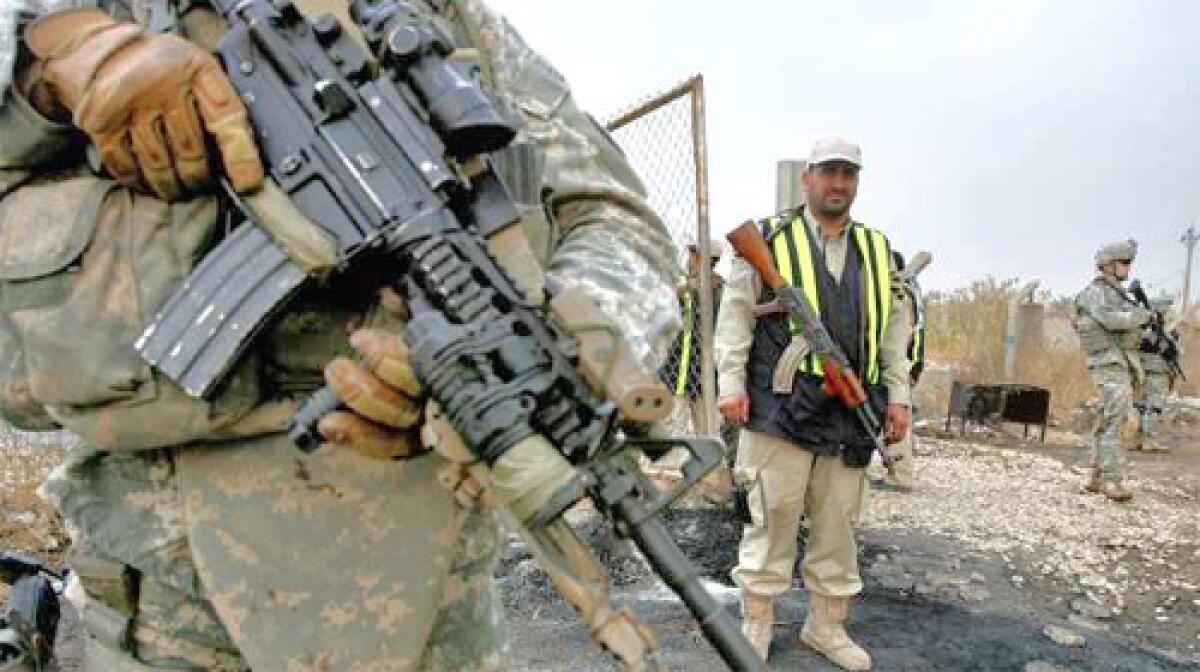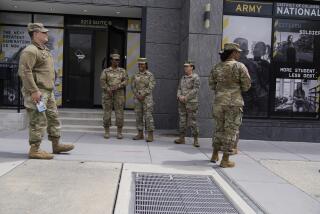U.S. shifts Sunni strategy in Iraq

Eager to cement the security gains of last year’s troop buildup, the U.S. military has shifted its strategy from the streets to the corridors of power in a high-stakes effort to persuade Iraq’s wary Shiite leaders to put thousands of predominantly Sunni men, many of them former insurgents, on the government payroll.
More than 70,000 members of mostly Sunni Arab groups now work for American forces in neighborhood security programs. Transferring them to the control of the Shiite Muslim-dominated government, as policemen and members of public works crews, has taken on a new urgency as American troops begin to withdraw, officials indicated in recent interviews, meetings and briefings.
The day-to-day commander in Iraq, Army Lt. Gen. Raymond T. Odierno, believes that the Iraqi government’s reconciliation with onetime Sunni fighters represents the “primary driver of enhanced security” over the next six months, according to internal military planning documents seen by The Times.
“It’s a big change,” said a top Odierno aide, who spoke on condition of anonymity because such plans have yet to be made public. “It’s a shift in the commander’s intent.”
So far, however, progress has been limited. Officials of Prime Minister Nouri Maliki’s government, fearing the creation of a potential rival army, are resisting the move. U.S. military officials fear that opposition could send the former insurgents among the Sunni guard corps, known as concerned local citizens, or CLCs, back into the battlefield.
“We’ve got a lull at the moment, an absolute lull in violence, but it could go anywhere next year, depending on how the current government reacts to it,” Odierno’s aide said. “One of our biggest risks are CLCs and which way they’ll go.”
The aide, like other U.S. officials, warned that the window of opportunity is narrow, and is dependent on the Iraqi government making the Sunni security groups, sometimes called Awakening Councils, part of the official government structure.
“If it doesn’t embrace it, you could have the different Sunni Awakenings coming together as a Sunni army that tries to overthrow the government, pushing the country into civil war,” the aide said. “It’s possible.”
The concerned citizens groups now serve as guards in areas where traditional security forces, such as the Iraqi army and police, are not present or are not trusted because of past sectarian abuses.
Not all are Sunnis. But experts on the staff of Army Gen. David H. Petraeus, the overall commander in Iraq, estimated at the end of November that about 80% then under U.S. contracts were Sunni. Each gets paid about $300 a month.
U.S. officials believe the concerned citizens groups have helped reduce violence by fighting extremists linked to the group Al Qaeda in Iraq and by redirecting insurgents.
Those officials, wary of creating parallel constabulary units that would rival government-controlled forces, have ramped up efforts to persuade the Baghdad government to attach the concerned citizens groups to the Iraqi police or civilian work corps.
The move marks an important shift in U.S. efforts to bring rival Shiite and Sunni factions together. Since the start of the U.S. troop buildup, Pentagon officials have tried to get Sunni and Shiite officials to reconcile, a process that U.S. officials acknowledge has largely failed.
The Shiite-led Iraqi parliament approved a bill Saturday that would allow many members of Saddam Hussein’s party, most of whom are Sunnis, to regain government jobs, but the measure was not related directly to the citizens groups. The law was approved only after months of debate, and other key reconciliation measures sought by the U.S. have languished.
Although not abandoning their efforts at the central government level, U.S. officials have made the hiring of Sunni guards the centerpiece of their new reconciliation strategy.
Last year, the Iraqi government cautiously supported a move to bring Sunnis who participated in the Awakening movement in Anbar province into the police force. But government resistance has stiffened as groups closer to Baghdad begin making the same transition.
So far, 1,730 members of the concerned citizens groups in the Baghdad suburb of Abu Ghraib have been allowed to become police officers. An additional 2,000 in the capital were accepted as members of the police force during the fall.
But even those limited numbers have been difficult for U.S. officials to clear through the Iraqi government.
“It’s still an obstacle,” said Army Col. Martin Stanton, the officer on Petraeus’ staff who is in charge of the effort. “They’re deeply suspicious of any organized group of Sunnis, especially ones that were former insurgents.”
Stanton said he would like to see most of the guards transferred to Iraqi control within the next eight months.
The move to set up concerned citizens groups sprang from the unexpected uprising of Sunni sheiks in Anbar against Al Qaeda in Iraq in 2006, when they approached U.S. military commanders to request permission to band together to protect their own neighborhoods.
Since then, Anbar has gone from the most violent province in Iraq to one of the quietest, and U.S. military officials have tried to replicate the model elsewhere. Local commanders used funds provided under a long-standing “emergency-response program” to pay the local groups.
Officials targeted cities and regions where Iraqi security forces did not exist, such as Arab Jabour, a largely Sunni rural area south of Baghdad, or were unwilling to actively patrol, like Baqubah, the war-torn capital of Diyala province to the north.
Mid-level U.S. officers acknowledge that many of the men being drafted into the CLC groups are former insurgents; one officer in east Baghdad marveled that he recently met over tea with CLC leaders who had been on his unit’s insurgent target list just weeks earlier.
“Our ‘concerned local citizens’ -- people say it without any hint of irony,” said one official. “One day, we remove the Al Qaeda patch and put on a CLC patch. Now they’re the good guys.”
But advocates of the program argue that such steps are inevitable, and in some cases desirable. They represent an acknowledgment that many Iraqis who were fighting U.S.-led forces were not hardened militants, but angry men looking to protect their neighborhoods from foreigners.
By becoming guards in previously unpatrolled areas in northern and central Iraq, the citizens groups have become a key stopgap, filling in security holes where U.S. forces have lacked the numbers to impose stability.
“The CLCs are bridging the gap, but unfortunately that can’t last forever,” said Army Brig. Gen. Joseph Anderson, Odierno’s chief of staff. “The government of Iraq [must] embrace it, and that’s a big battle right now: Are they going to embrace these under their own contracts?”
U.S. officials have acknowledged that the Iraqi police forces are not large enough to absorb all 70,000 of the men.
Odierno said last month that fewer than a quarter will become government security personnel. As a result, U.S. officials have begun a pilot program to develop a civil service corps to employ the men.
“We’ll teach them skills, like repairing pipes, electricity, sewage,” Odierno said. Still, officials aren’t certain such programs can absorb the huge numbers of the concerned local citizens.
Approval from the central government represents a larger hurdle.
Odierno has had a series of lengthy and intense meetings with Iraqi officials to sell them on the idea and said last month that the two sides have agreed to a series of “very strict” requirements to temper Iraqi concerns.
Among them are restrictions on the citizens groups operating outside the control of the U.S. military or Iraqi government and a limitation on the number of group members who will be moved into the formal security forces.
Iraqi officials have raised concerns that citizens groups have been infiltrated by hard-core insurgents, a possibility U.S. officials have openly acknowledged.
“Are there people trying to infiltrate them? Yes,” Odierno said. “But we can sort through that. The majority of them just want to be part of the government of Iraq. Before, there was no avenue for them to become part of the government of Iraq.”
Times staff writer Tina Susman contributed to this report.
More to Read
Start your day right
Sign up for Essential California for news, features and recommendations from the L.A. Times and beyond in your inbox six days a week.
You may occasionally receive promotional content from the Los Angeles Times.





